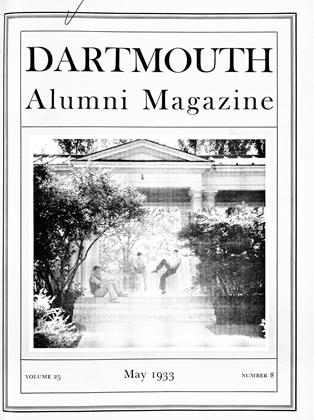By Herbert Faulkner West, The Arts Press, Hanover, N. H., 1933.
That the art of book collecting is one which leaves shelves loaded with miscellaneous tomes of various sizes and shapes and backgrounds and therefore unwieldy and ground-weighted is a theory which Professor West refutes in this delightful little pamphlet of chapbook composition. If Clara Bow and King George V can find intellectual compatibility in stamp collecting why may not dozens of people find sympathetic relationship in the possession of much loved books? But the books must reflect the taste of the collector; otherwise there is no sense in collecting. Therefore one is to pick one's several favorite authors, gather up manuscripts, letters, books and develop (as the writer has) an authority and a pleasant discoursive manner upon the hobby.
With one's field chosen, the collecting begins, be it Chinese, Irish, Russian, or perhaps G. B. Shaw. All over the world leads the trails, the shops of London (and don't forget the shades of Newbery in St. Paul's graveyard) the banks of Seine, the grottos, ghettos, and biblioteks, the heart of Rome and the heart of Prague, the nevsky Prospect in Leningrad and the street of the New World in Warsaw. The writer gives some good tips on London bookshops which the novice in the art may well follow, and he also maps out a little the course of one's conduct in dealing with a book-seller.
After all, it is the keeper of a real bookshop who is your greatest book lover. Money will not buy him, nor will flattery cajole. He is the rare pinion of a moneymad and a money-depressed world. He cares not for analysis nor criticism, neither for method nor purpose in art; he knows by instinct the worth of a book, and he can tell by the "feel" whether or not a volume is worthy of perusal. Pulpits may thunder and university chairs declaim,— the book seller alone knows which books live and which books do not. There is no good and bad with him; one finds all kinds of books beneath his eye, but of those which possess not life he has nothing to say.
This is what Professor West advises; "go to the book seller thou sluggard and consider his tastes." He has this advice and comment in a charming, cheap little Chapbook, and J. M. Benson a college junior sets it up in type which W. K. Flaccus chooses,—all in the basement of Baker Library. And thou stranger after passing the door of that print shop, return and look in and appreciate, and then, Go (as the Latin of Eleazar Wheelock's tombstone directs) and Emulate These Deeds.
 View Full Issue
View Full Issue
More From This Issue
-
 Article
ArticleHANOVER BROWSING
May 1933 By Rees Higgs Bowen -
 Class Notes
Class NotesClass of 1910
May 1933 By Harold P. Hinman -
 Class Notes
Class NotesClass of 1929
May 1933 By Frederick William Andres -
 Class Notes
Class NotesClass of 1902
May 1933 By Hermon W. Farwell -
 Article
ArticleDARTMOUTH'S WATCH ON THE RHINE
May 1933 By Gail M. Raphael '34 -
 Class Notes
Class NotesClass of 1932
May 1933 By Charles H. Owsley
E. P. K.
Books
-
 Books
BooksTouraine and Champaigne
August 1945 -
 Books
BooksFaculty Articles
April 1946 -
 Books
BooksRELIGIOUS TRENDS IN MODERN CHINA
October 1953 By EARL CRANSTON '16 -
 Books
BooksDR SCARLETT:
November 1936 By H. M. Dargan -
 Books
BooksTHE U. S. EASTERN SKI ANNUAL
April1935 By John P. Carleton '22 -
 Books
BooksCONTEMPORARY UNIONISM IN THE UNITED STATES
January 1949 By Ross Stagner







